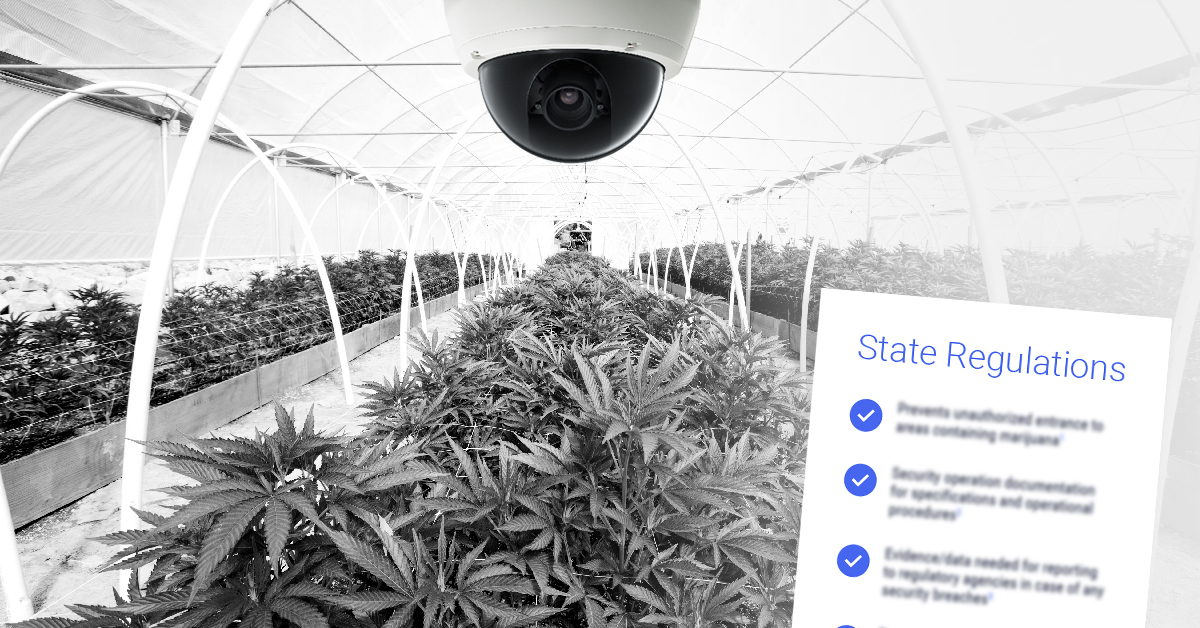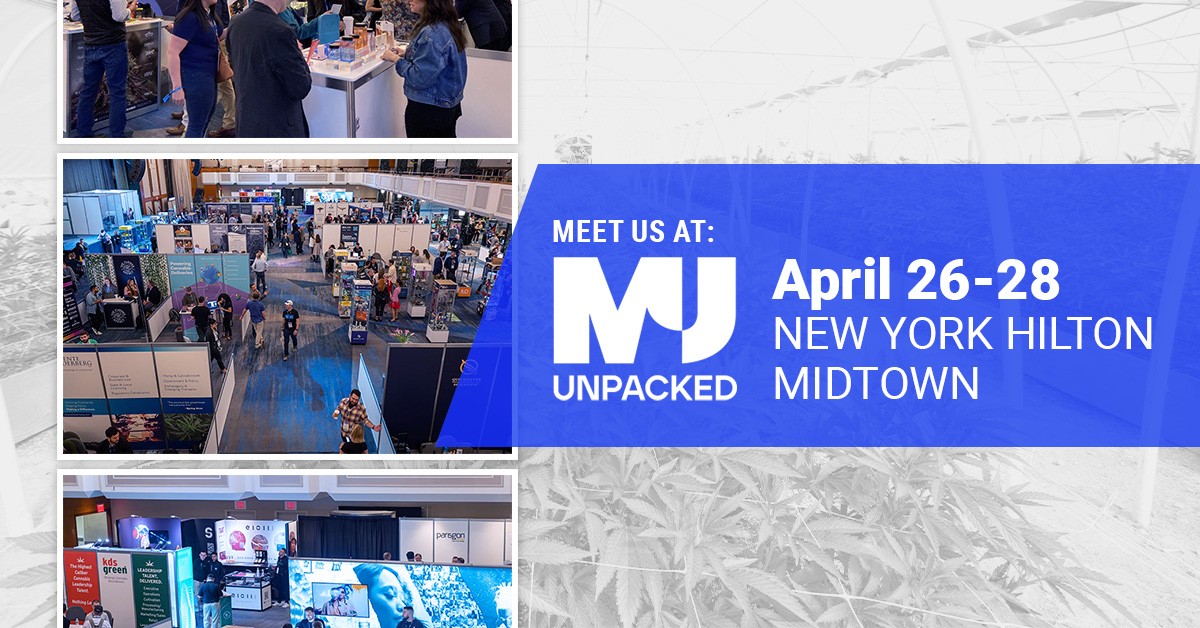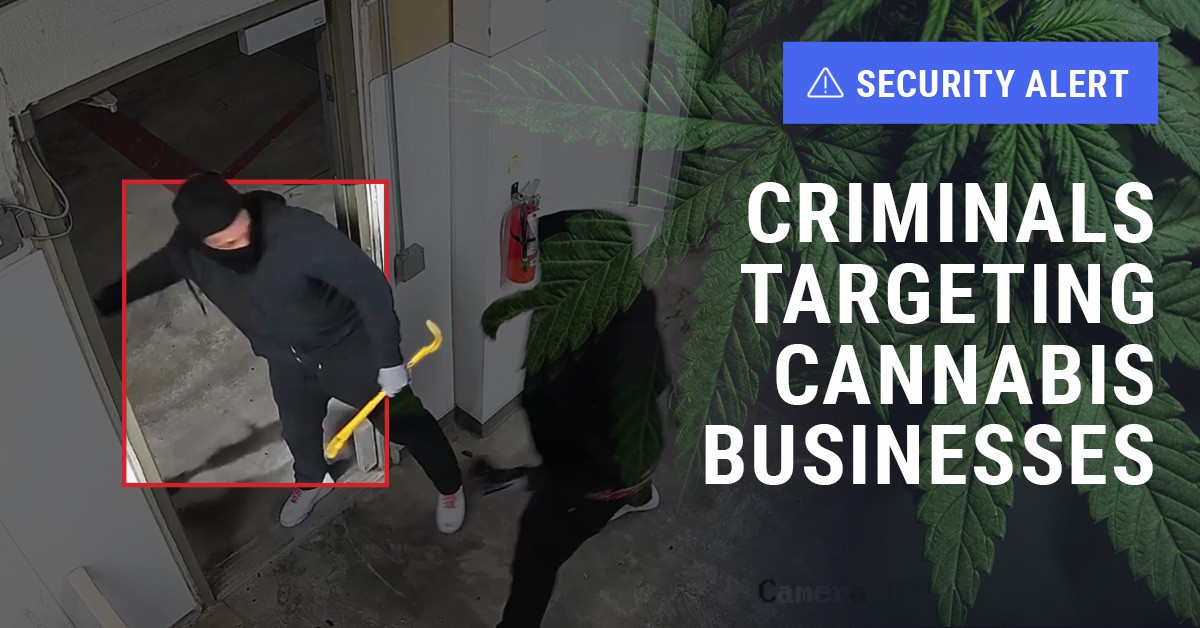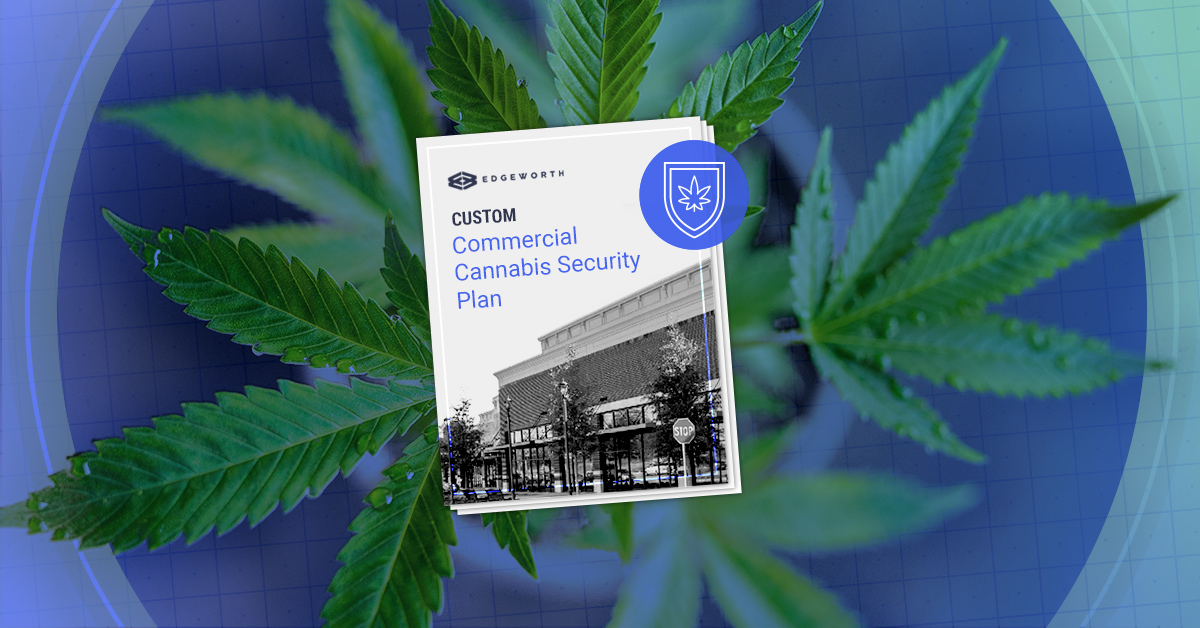
Edgeworth Security’s Remote Guard Solutions helps grow operations and dispensaries meet and exceed their state’s requirements
Owners of retail dispensaries and grow farms are undoubtedly familiar with the very strict regulations imposed on the commercial cannabis industry – especially when it comes to security. Because marijuana remains illegal at the federal level, grow operations and dispensaries alike must fine-tune their security efforts on a state-by-state level to meet these tough requirements.
Additionally, as dispensaries are often cash-heavy businesses, they’re prime targets for a growing number of burglaries. This leaves many dispensaries vulnerable and in need of hardened and proven security solutions.
The Challenge of Strict Security RegulationsDue to the fact that cannabis legalization is enacted at the state level, security regulations vary depending on the location of the operation. Despite state-by-state variation, most regulations share these common requirements: |
How Edgeworth Meets and Exceeds Those ChallengesEdgeworth Security designs and installs bespoke comprehensive state of the art security systems tailored to each grow operation and dispensaries’ exact needs. |
|---|---|
| Businesses must take sufficient safety measures to prevent unauthorized entrance into areas containing marijuana | Access control and Intrusion systems are triggered by unauthorized personnel with our built-in artificial intelligence — which immediately identifies unusual activity |
| Appropriate regulatory agencies must be notified in the event of an incident | Our U.S. based monitoring center, owned and managed by Edgeworth, allows us to respond to incidents in the moment and we maintain close relationships with local law enforcement agencies to ensure quick engagement of law enforcement when needed |
| Licensed premises must have a video surveillance system. Many states specify that video quality must be high definition | Our state of the art cameras record 24/7 in high definition for future reference |
| There must be adequate monitoring and storage of video surveillance recordings | Our live agents use video surveillance with built-in artificial intelligence to remotely monitor properties 24 hours a day, 7 days a week |
| There must be a functional alarm system that unauthorized access triggers an alert | When our smart technology identifies an active incident, Edgeworth security agents are instantly alerted and activate Voice Down Live Communication to communicate directly with intruders. Voice Down is extremely effective, deterring 93% of trespassers in the moment. |
A Budding Market Makes a Prime Target

Choosing the right security solution is a critical investment for any grow operation or dispensary. Criminals are becoming increasingly aware of the easy-to-traffic product and high cash holds of dispensaries and grow operations. In fact, just last year, Denver reported a 3-year high of crimes at dispensaries following a rash of armed robberies. Not only did thieves walk off with expensive product and cash, but grow operations are having a harder time finding reliable employees willing to work in dangerous conditions.
On average, more than 100 burglaries occur at cannabis businesses each year according to the Denver Police Department, and burglaries and theft comprise almost 80% of Denver’s cannabis industry-related crime.
One dispensary reported that their three locations had been burglarized a total of eight times.
Across the U.S., dispensaries and grow farms are reporting huge losses from theft and armed burglaries. In San Francisco, a study showed that more than half of the area’s dispensaries were targeted by burglars. Additional, these crimes have high yields as the average thief walks away with “anywhere from $20,000 to $50,000 in a single theft”
Because of the threat, marijuana retail outlets are progressively aiming to have their state security regulations serve only as a baseline for comprehensive and detailed security measurements. By engaging a custom security solution that uses state of the art technology that incorporates artificial intelligence, machine learning, military grade analytics, Edgeworth is able to transform the cannabis industry’s safety and secure economic well-being for dispensaries and grow operations.
Traditional security solutions just don’t measure up to the unique threats facing commercial marijuana businesses, even if they happen to meet a state’s regulations. Physical guards alone aren’t capable of being everywhere and seeing everything at once. CCTV isn’t proactive and alone can’t stop criminal activity. Remote Guard blankets a location in smart technology, advanced analytics and artificial intelligence and together immediately identifies threats. These threats are then managed in the moment by live, highly trained agents.
Challenges Plaguing Commercial Cannabis Industry
High value product attracts criminals and crimes of opportunity
Because dispensaries offer almost exclusively high value products in very small, easy to pocket packages, mitigating product loss is essential for maintaining profitability. While having trusted employees is the first step, the right security solutions can both discourage shrinkage in the first place and proactively protect inventory, without being obtrusive

Edgeworth’s video surveillance isn’t reactive – it assesses possible criminal activity in real time. Using high definition audio and video, the built-in artificial intelligence can distinguish between suspicious activity versus ordinary activity, as well as between human, vehicular or other disturbances - eliminating false alarms. Additionally, Edgeworth’s video technology is state of the art, utilizing cutting edge audio and video display. Crystal clear video and advanced analytics makes the difference in identifying and preventing subtle criminal activity.
Cash-heavy business
Because marijuana is still federally illegal, some businesses within the industry and companies that serve them can have a difficult time finding financial institutions or banks that will work with them. This means that accounts, loans or credit lines that regular businesses thrive on can be limited or nonexistent. As a result, grow operations are largely functioning on cash – and criminals have caught on. Currently, the system is incredibly inefficient at dealing with the flourishing market. Local municipalities are realizing this and making an effort to play catch-up. Credit Unions are also stepping up, but even as laws are passed and banking begins edging its way in, cannabis buyers are still largely using cash as their preferred payment. Where criminal activity is concerned, it’s a simple equation for a complicated problem – more cash means more risk.
Employing 24/7 security personnel is not only costly, but guards have been known to sleep on the job or may not be equipped to handle aggressive burglary situations as a trained officer would. With Edgeworth’s highly alert A.I. technology, any breach of your grow operation at any hour will be instantly alerted and local law enforcement dispatched. For businesses that hold large cash deposits, having proactive, round-the-clock security is essential for protecting against robberies or looting situations.
Easily Trafficked product with preexisting ties to criminal activity
Because cannabis was an illegal substance until its first introduction for medicinal purposes in 1996 and state-only recreational as late as 2012, there has been decades of underground networking in the illicit drug trade. Having already established a stable foundation for illegal trafficking, any product stolen from reputable dispensaries or grow operations is easily transferred on the streets.
If a suspicious individual breaches the property, Edgeworth Remote Guard will alert our highly trained agents who will Voice Down to the person of interest. A Voice Down is where a live agent addresses the individual through speakers on the property with clear instructions. Voice Down has a 93% success rate in deterring unwanted activity, including theft and trespassing. In the rare event a criminal doesn’t stop what they’re doing and leave, Edgeworth’s close relationship with the local police and video verification ensures quick dispatch of law enforcement and apprehension of suspects. Edgeworth is backed by years of military, law enforcement and security experience and has been designed to tackle modern problems with cutting edge technology so cannabis retailers can have the peace of mind knowing not only are they exceeding their states security regulations, but there business and their people are protected.
State-by-state security law
California
The law requires cannabis operations to install a robust and comprehensive video surveillance system.
The CDPH regulations require cannabis manufacturers to develop and implement a written security plan addressing, at minimum:
- Preventing access by unauthorized persons.
- Protecting physical safety of employees.
- Preventing against theft or loss of cannabis products.
- Securing electronic records to prevent unauthorized access and backing up electronic records to ensure integrity of information is maintained.
- Also, cannabis manufacturers must install and operate a video surveillance system on their premises to record areas in which cannabis or cannabis products are stored, prepared or moved and at the facility’s entrances and exits.
With video surveillance:
The State of California requires video surveillance in the following areas of a cannabis operation:
- Wherever cannabis goods are weighed, packed, stored, loaded and unloaded for transportation, prepared or moved within the premises
- limited-access areas
- security rooms
- areas storing a surveillance-system storage device with at least one camera recording the access points to the secured surveillance recording area
- entrances and exits to the premises, which shall be recorded from both indoor and outdoor
In addition:
- Cameras on the premises must have a minimum camera resolution of 1280 x 720 pixels.
- The surveillance-system storage device or the cameras themselves shall be transmission control protocol (TCP) capable to make them accessible via the Internet.
- The video surveillance system must always effectively and clearly record images of the area.
- Each camera must be permanently mounted and in a fixed location.
- Each camera must be placed in a location that allows it to clearly record activity occurring within 20 feet of all points of entry and exit on the licensed premises.
- The cameras also must be capable of clearly and certainly identifying any person and activities in the area being filmed.
- Cameras shall record continuously 24 hours per day and at a minimum of 15 frames per second (FPS).
- The physical media or storage device on which surveillance recordings are stored shall be secured in a manner to protect the recording from tampering are theft.
- Surveillance recordings shall be kept for a minimum of 90 days and stored in a manner that allows regulatory bodies to review them upon request.
- Recorded images shall be time and date stamped.
- The system must be equipped with a failure notification system that notifies the licensee of any interruption or failure of the video surveillance system or storage system.
Colorado
Security Alarm Systems – Minimum Requirements.
The following Security Alarm Systems and lock standards apply to all Retail Marijuana Establishments:
- Each Licensed Premises shall have a Security Alarm System, installed by an Alarm Installation Company, on all perimeter entry points and perimeter windows.
- Each Licensee must ensure that all of its Licensed Premises are continuously monitored. Licensees may engage the services of a Monitoring Company to fulfill this requirement.
- A Licensee shall maintain up-to-date and current records and existing contracts on the Licensed Premises that describe the location and operation of each Security Alarm System, a schematic of security zones, the name of the Alarm Installation Company, and the name of any Monitoring Company.
- Upon request, Licensees shall make available to agents of the Division or relevant local jurisdiction or state or local law enforcement agency, for a purpose authorized by the Retail Code or for any other state or local law enforcement purpose, all information related to Security Alarm Systems, Monitoring, and alarm activity.
- Any outdoor or greenhouse Retail Marijuana Cultivation Facility is a Limited Access Area and must meet all of the requirements for Security Alarm Systems described in this rule.
- The entire Limited Access Area shall be surrounded by a fence that measures at least eight feet from the ground to the top of the fence and is constructed of at least a six-gauge or higher metal chain link fence or another similarly secure material but may not be wood. All support posts shall be steel and securely anchored.
- All entry gates shall measure at least eight feet from the ground to the top of the entry gate and shall be constructed of a six-gauge or higher metal chain link fence or a similarly secure material but may not be wood.
- The fence shall obscure the Limited Access Area so that it is not easily viewed from outside the fence.
- The perimeter of the fence shall be surrounded with lights illuminating all sides of the fence for at least 20 feet from the fence. The required lights may be but are not required to be motion sensing.
Lock Standards – Minimum Requirement:
- At all points of ingress and egress, the Licensee shall ensure the use of a commercial grade, non-residential door locks.
Video Surveillance Equipment
- Video surveillance equipment shall, at a minimum, consist of digital or network video recorders, cameras capable of meeting the recording requirements described in this Rule, video monitors, digital archiving devices, and a color printer capable of delivering still photos.
- All video surveillance systems must be equipped with a failure notification system that provides prompt notification to the Licensee of any prolonged surveillance interruption and/or the complete failure of the surveillance system.
- Licensees are responsible for ensuring that all surveillance equipment is properly functioning and maintained so that the playback quality is suitable for viewing and the surveillance equipment is capturing the identity of all individuals and activities in the monitored areas.
- All video surveillance equipment shall have sufficient battery backup to support a minimum of four hours of recording in the event of a power outage.
Placement of Cameras and Required Camera Coverage
- Areas, where Medical Marijuana is grown, tested, cured, manufactured, researched, or stored, or sold shall have camera placement in the room facing the primary entry door and is unobstructed. For more information on camera coverage click here.
Video Recording and Retention Requirements
- All camera views of all Limited Access Areas must be continuously recorded 24 hours a day. The use of motion detection is authorized when a Licensee can demonstrate that monitored activities are adequately recorded.
- All surveillance recordings must be kept for a minimum of 40 days and be in a format that can be easily accessed for viewing. Video recordings must be archived in a format that ensures authentication of the recording as legitimately-captured video and guarantees that no alteration of the recorded image has taken place.
- The Licensee’s surveillance system or equipment must have the capabilities to produce a color still photograph from any camera image, live or recorded, of the Licensed Premises.
- The date and time must be embedded on all surveillance recordings without significantly obscuring the picture. The date and time must be synchronized with any point-of-sale system.
- Time is to be measured in accordance with the official United States time established by the National Institute of Standards and Technology and the U.S. Naval Observatory at: http://www.time.gov/timezone.cgi?Mountain/d/-7/java.
- After the 40-day surveillance video retention schedule has lapsed, surveillance video recordings must be erased or destroyed prior to sale or transfer of the facility or business to another Licensee or being discarded or disposed of for any other purpose. Surveillance video recordings may not be destroyed if the Licensee knows or should have known of a pending criminal, civil or administrative investigation or any other proceeding for which the recording may contain relevant information.
Florida
Florida Statute 381.986, Section 6:
To ensure the safety and security of premises where the cultivation, processing, storing, or dispensing of marijuana occurs, and to maintain adequate controls against the diversion, theft, and loss of marijuana or marijuana delivery devices, a medical marijuana treatment center shall:
- Maintain a fully operational security alarm system that secures all entry points and perimeter windows and is equipped with motion detectors; pressure switches; and duress, panic, and hold-up alarms; or
- Maintain a video surveillance system that records continuously 24 hours each day and meets the following criteria:
- Cameras are fixed in a place that allows for the clear identification of persons and activities in controlled areas of the premises. Controlled areas include grow rooms, processing rooms, storage rooms, disposal rooms or areas, and point-of-sale rooms;
- Cameras are fixed in entrances and exits to the premises, which shall record from both indoor and outdoor, or ingress and egress, vantage points;
- Recorded images must clearly and accurately display the time and date.
- Retain video surveillance recordings for a minimum of 45 days or longer upon the request of a law enforcement agency.
- Require at least two of its employees, or two employees of a security agency with who it contracts, to be on the premises at all times where cultivation, processing, or storing marijuana occurs.
Pennsylvania
A dispensary shall have security and surveillance systems, utilizing commercial-grade equipment, to prevent unauthorized entry and to prevent and detect an adverse loss.
A professionally-monitored security alarm system that includes the following:
- Coverage of all facility entrances and exits; rooms with exterior windows, exterior walls, roof hatches or skylights; storage rooms, including those that contain medical marijuana and safes; and the perimeter of the facility.
- A silent security alarm system signal generated by the entry of a designated code into an arming station in order to signal that the alarm user is being forced to turn off the system.
- An audible security alarm system signal generated by the manual activation of a device intended to signal a life-threatening or emergency situation requiring law enforcement response.
- A silent alarm signal generated by the manual activation of a device intended to signal a robbery in progress.
- Electrical, electronic, mechanical or other devices capable of being programmed to send a prerecorded voice message requesting dispatch, when activated, over a telephone line, radio or other communication systems to a law enforcement, public safety or emergency services agency.
- A failure notification system that provides an audible, text or visual notification of any failure in the systems. The failure notification system must provide by telephone, e-mail or text message an alert to a designated security person within the facility within 5 minutes after the failure..
- Auxiliary power sufficient to maintain security and surveillance systems for at least 48 hours following a power outage.
- The ability to ensure all access doors are not solely controlled by an electronic access panel to prevent locks from becoming released during a power outage.
- Motion detectors.
- A professionally-monitored security and surveillance system that is operational 24 hours per day, 7 days per week and records all activity in images capable of clearly revealing facial detail.
The security and surveillance system must include all of the following:
- Fixed camera placement that allows for a clear image of all individuals and activities in and around the following:
- Any area of a facility where medical marijuana products are loaded or unloaded into or from transport vehicles.
- Entrances to and exits from a facility. Entrances and exits must be recorded from both indoor and outdoor vantage points.
- Rooms with exterior windows, exterior walls, roof hatches or skylights and storage rooms, including those that may contain medical marijuana products and safes.
- Five feet from the exterior of the perimeter of a facility.
- All limited access areas.
- Auxiliary power sufficient to maintain security and surveillance systems for at least 48 hours following a power outage.
- The ability to operate under the normal lighting conditions of each area under surveillance.
- The ability to immediately produce a clear, color, still photographs in a digital format that meets the requirements of this subsection.
- The ability to clearly and accurately display the date and time. The date and time must be synchronized and set correctly and may not significantly obscure the picture.
- The ability to record and store all images captured by each surveillance camera for a minimum of 2 years in a format that may be easily accessed for investigative purposes.




